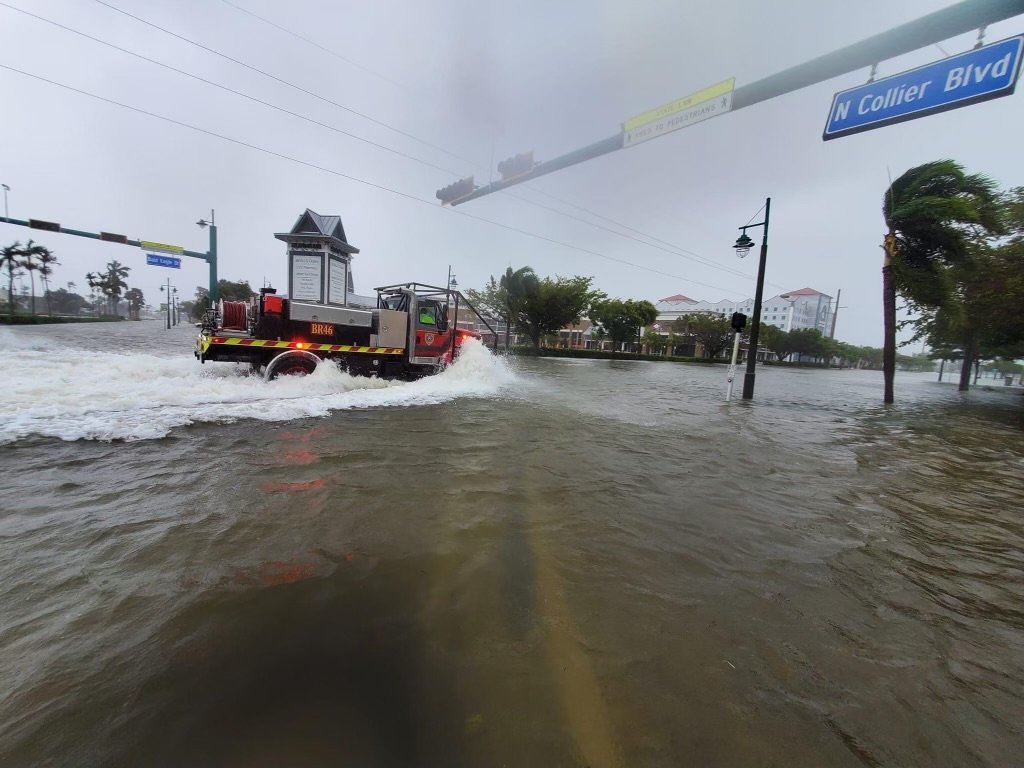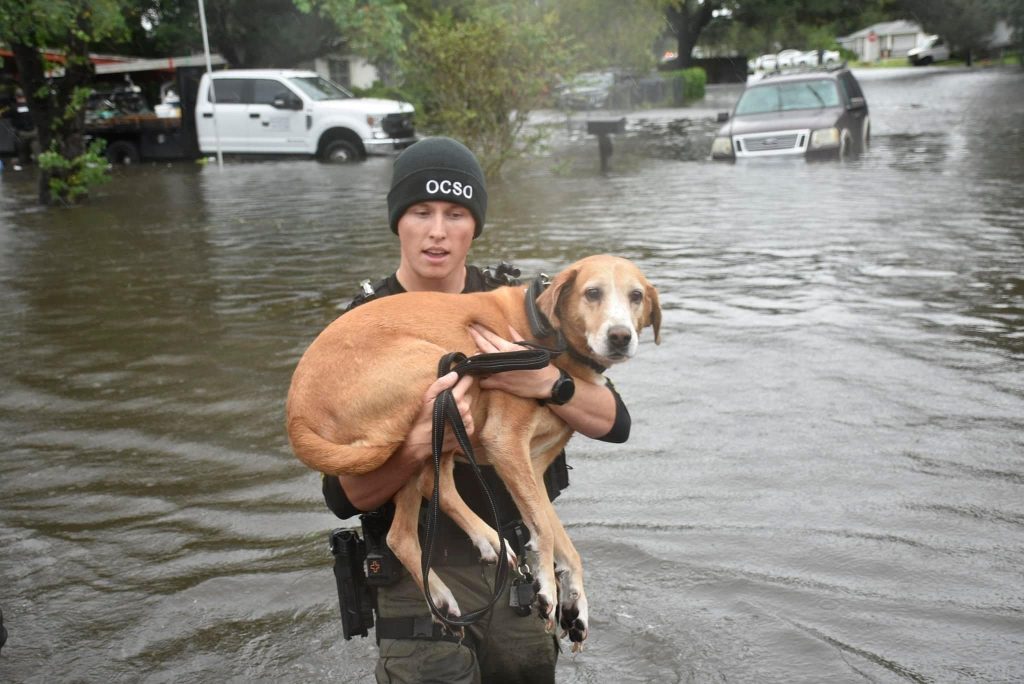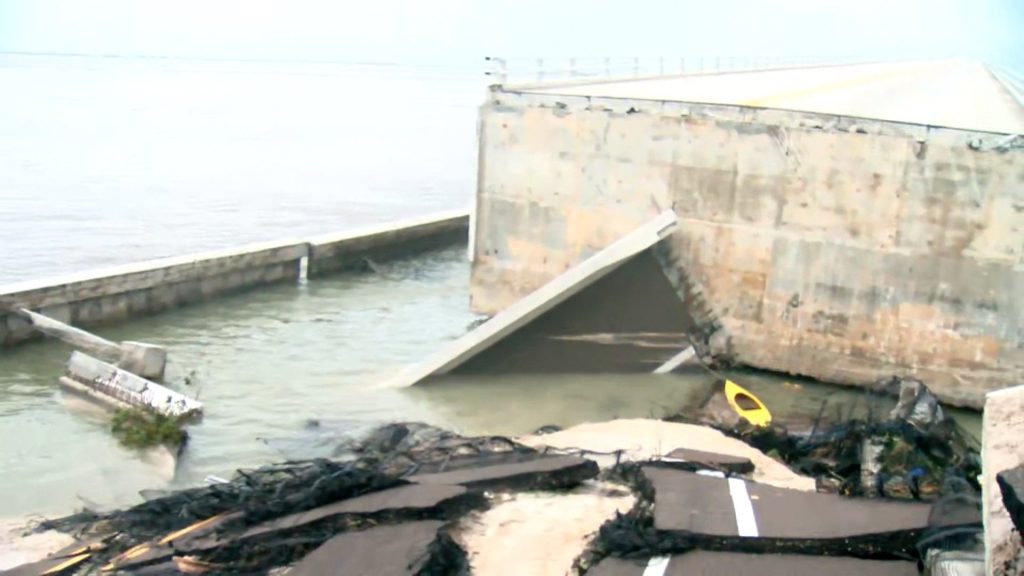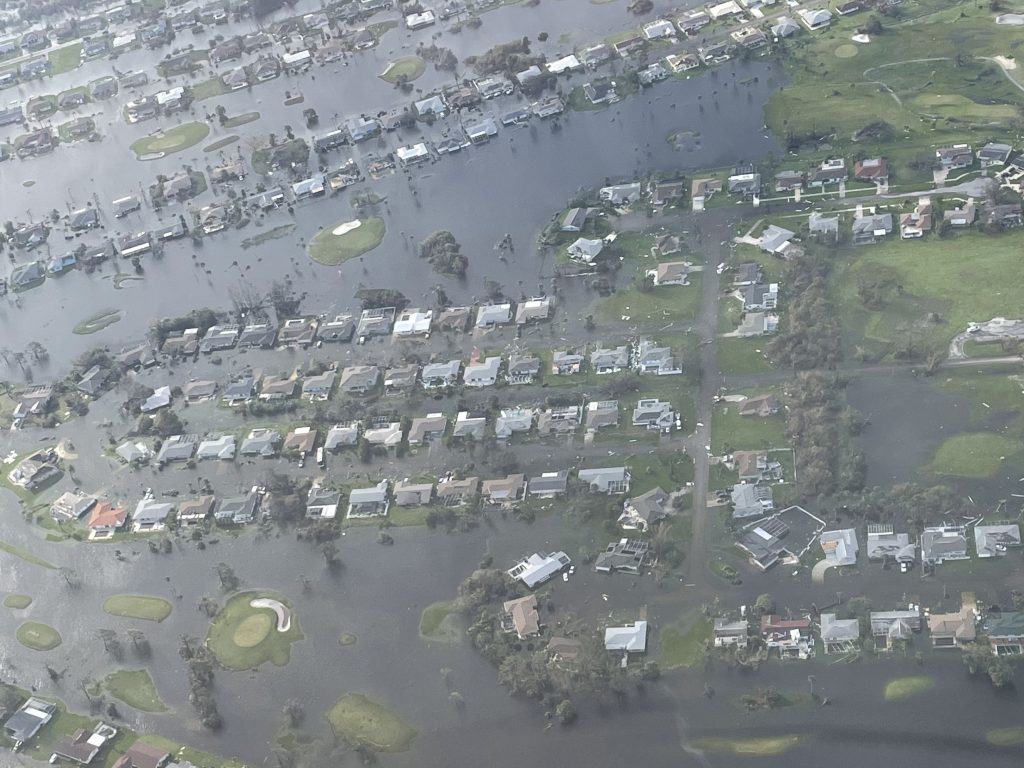
(CNN) — Rescuers have been pulling people from roofs as they work to respond to hundreds of calls for help since Ian — now a tropical storm marching across Florida — slammed the state’s west coast as a Category 4 hurricane, its surge trapping residents and its monstrous winds and flooding rains leaving millions without power and many without drinkable water.
Many are believed to need rescuing in hard-hit southwest Florida’s Fort Myers area, FEMA chief Deanne Criswell said Thursday morning. The nearby Naples area was similarly slammed — feet of water submerged streets, nearly swallowing vehicles and rushing into the first floors of homes and businesses — after Ian’s center plowed ashore near Cayo Costa on Wednesday afternoon as one of the strongest storms ever to make landfall on Florida’s west coast.
The Coast Guard and National Guard were “pulling people off of roofs in Fort Myers” with aircraft Thursday morning, Coast Guard Rear Adm. Brendan McPherson told CNN. Coast Guard crews have rescued at least 23 people since Wednesday, the service said.
Roughly five people are believed to have died in Lee County, the sheriff said, and parts of a key bridge there from Sanibel and Captiva islands to Florida’s mainland have been washed out.
Collapsed buildings, flooding, downed power lines and impassable roads were reported early Thursday by survey crews across southwest Florida. More than 2.5 million homes and businesses statewide have no power Thursday morning, according to PowerOutage.us, and some drinking water systems have broken down completely or have boil notices in effect.
Still, much about the misery remains unknown: how many lives Ian may have ended, how many people remain trapped, how many homes were wrecked beyond repair and how long it might take to restore a semblance of ordinary life.
As Ian pushed inland, ocean water piled up onshore Wednesday — 12 feet in some places — and 150-mph winds whipped. 911 call centers in several counties were inundated.
Scott Carlos, who rode out the storm in his fourth-story Fort Myers condo, saw waves of water crash into homes across the street, up to their roofs, he said.
Roads are littered Thursday with washed-out vehicles, he told CNN on Thursday. “Everybody’s garages basically just gave out. … Cars are everywhere, smashed up in the street. There’s debris everywhere.”
As Ian continues trudging northeast, heavy rain and flooding has been reported in the Orlando area, where 8 to 12 inches of rain had already fallen and up to 4 more inches of rain was expected. In Orlando, a reporter for CNN affiliate WESH rescued a woman after seeing her trying to drive through floodwaters, carrying her on his back in waist-high water to dry ground, WESH video showed.
Here are the latest developments:
• Downgraded to a tropical storm: Ian weakened to a tropical storm early Thursday with winds of 65 mph, and the center of the storm was about 40 miles east of Orlando around 8 a.m. ET, the National Hurricane Center said. Based on wind speed, Ian tied with 2004’s Hurricane Charley as the strongest storm to make landfall on the west coast of the Florida Peninsula, both with 150-mph winds at landfall.
• Tropical storm warnings still in place: Hurricane warnings along the east and west coasts of Florida were changed to tropical storm warnings when the system weakened. The warnings on the East Coast stretched north to Cape Lookout, North Carolina.
• Record-high storm surges: Ian’s storm surge hit up to 12 feet in some places in western Florida. On Thursday morning, a storm surge warning — meaning life-threatening surges could hit — was in place for a coastal stretch from northeastern Florida into an area north of Charleston, South Carolina.
• More than a foot of rainfall: Lehigh Acres near Fort Myers got 14.42 inches of rain, and Warm Mineral Springs near Port Charlotte got 11.05 inches. Up to 30 inches of rain may have fallen in parts of Florida by storm’s end, forecasters say.
• Other states brace for Ian’s destruction: The storm on Thursday is expected to move into the Atlantic Ocean, threatening coastlines. Governors in Georgia, Virginia, North Carolina and South Carolina have already declared states of emergency.

Rescue efforts stymied as hurricane traps residents
In badly hit southwest Florida, a “three-pronged” search and rescue response is taking shape, with crews fanning out and help residents by air, ground and sea as soon as it’s safe, state emergency management director Kevin Guthrie said Wednesday.
Calls for help came in Wednesday and Thursday across several counties.
In Fort Myers — where about 96% of the city was without power — Fire Chief Tracy McMillion told residents to stay inside, and to stay hopeful. “We’re coming for you, be encouraged,” he told residents Wednesday night.
The city’s downtown streets were flooded Wednesday with almost 4 feet of water, Mayor Kevin Anderson told CNN.
Thomas Podgorny was trapped in his two-story home in Fort Myers with three others, watching vehicles float away outside and worrying about others who did not evacuate, he told CNN Wednesday evening.
“I’ve lost my house. I have water and gas flowing through my bottom floor,” he said. “My neighbors have very little breathing room in their one-story house.”
One couple there was trapped in their home when the ceiling caved in.
“Something is dripping on me,” Belinda Collins recalled her partner saying. “He got up, and the ceiling — the family room ceiling — caved in.” They called 911 and were waiting for a call back about when it would be safe to leave, they said.
In Port Charlotte, the storm tore off the roof above a hospital’s ICU with patients inside Wednesday, forcing staff to move them to a post-operation recovery area, Dr. Birgit Bodine, an internal medicine specialist at the facility, told CNN.
Water gushed down stairwells to other floors, and other patients needed to be moved either to beds in hallways or to a different, dry wing of the hospital.
“We still have water in hallways that we’re still sloshing through,” but patients are safe in dry beds, and as many as possible were transferred to the dry wing, Bodine told CNN Thursday morning.
People in nearby Collier County, which includes Naples, were also trapped in their homes, calling for help, after electricity went out. In Naples, half the streets were not passable Wednesday because of high water, officials said.
“Some are reporting life threatening medical emergencies in deep water. We will get to them first. Some are reporting water coming into their house but not life threatening. They will have to wait. Possibly until the water recedes,” the Collier County Sheriff’s Office said Wednesday evening.
Complicating matters, neighboring Lee County’s 911 system was down and calls were being rerouted to Collier County, Chief Stephanie Spell told CNN. “At this point the majority of our 911 calls are water rescues,” Spell added.
In Sarasota County, sheriff’s deputies and fire crews had a backlog Thursday morning of more than 500 calls for help to respond to, the county sheriff’s office said. Deputies were “responding to the highest priority calls” that still were in the queue Thursday morning, the office said.
Emergency crews in Charlotte County were not able to respond to 911 calls Wednesday due to dangerous storm conditions, county Emergency Management Director Patrick Fuller told CNN.
Curfews were in effect for residents in Collier, Lee and Charlotte counties while severe conditions continued.

Monster storm leaves ‘life-changing’ mark on Florida
Even before the hurricane made landfall, officials knew the damage would be severe, and there will be a long road to recovery.
“Ian is going to be a life-changing event. This is a very powerful, catastrophic storm that is going to do significant damage,” President and CEO of Florida Power & Light Eric Silagy, said.
Some sections of infrastructure will be irreparable and need to be rebuilt — which can take weeks, Silagy said.
In Fort Myers Beach, key drinking water equipment failed, town spokesperson Jennifer Dexter told CNN.
“When the backup water pump system goes down, that shows you how serious it is,” she said.
Punta Gorda’s water system is empty and boil-water notices are in effect, according to an update from the city overnight.
Lee County Utilities issued a systemwide boil-water notice for all customers effective immediately due to the impacts of the hurricane, according to county officials. Residents in parts of Pasco County were also asked to boil their tap water as the water distribution system in the area lost pressure and a water main ruptured.
In Manatee County, residents were asked to limit flushing, showering, doing dishes and laundry due to power outages impacting the system.
In Cape Coral, authorities were getting reports of significant structural damage across the city, Ryan Lamb, the city’s fire chief and emergency management director, told CNN.
Florida Gov. Ron DeSantis has asked President Joe Biden to approve a major disaster declaration for all 67 counties in the state, his office said in a news release. DeSantis is also asking Biden to grant FEMA the authority to provide 100% federal cost share for debris removal and emergency protective measures for the first 60 days from Ian’s landfall.
Where Ian is headed next
After walloping Cuba and making landfall in Florida, Ian is expected to slowly move across eastern Florida before exiting Thursday afternoon into the Atlantic Ocean. It is then expected to whip coastal Georgia and South Carolina, with the center likely crossing over South Carolina by Friday, forecasters said.
There is a danger of “life-threatening” storm surge on Thursday and Friday along the coasts of northeast Florida, Georgia and South Carolina, according to the National Hurricane Center. Hurricane conditions are also possible in those areas.
The storm is expected to have dropped 12 to 30 inches of rain across central Florida by storm’s end, the hurricane center said.
About 4 to 12 inches of rain are possible in northeast Florida, coastal Georgia and South Carolina’s low country; about 3 to 8 inches of rain are possible in upstate and central South Carolina, North Carolina and southern Virginia, the hurricane center said.
Correction: An earlier version of this story had the incorrect location for storm witness Scott Carlos. He was in Fort Myers, Florida.






More Stories
Historic win for Bajan golfer
Israeli missile strikes Iran
Guyanese authorities probing sibling’s deaths